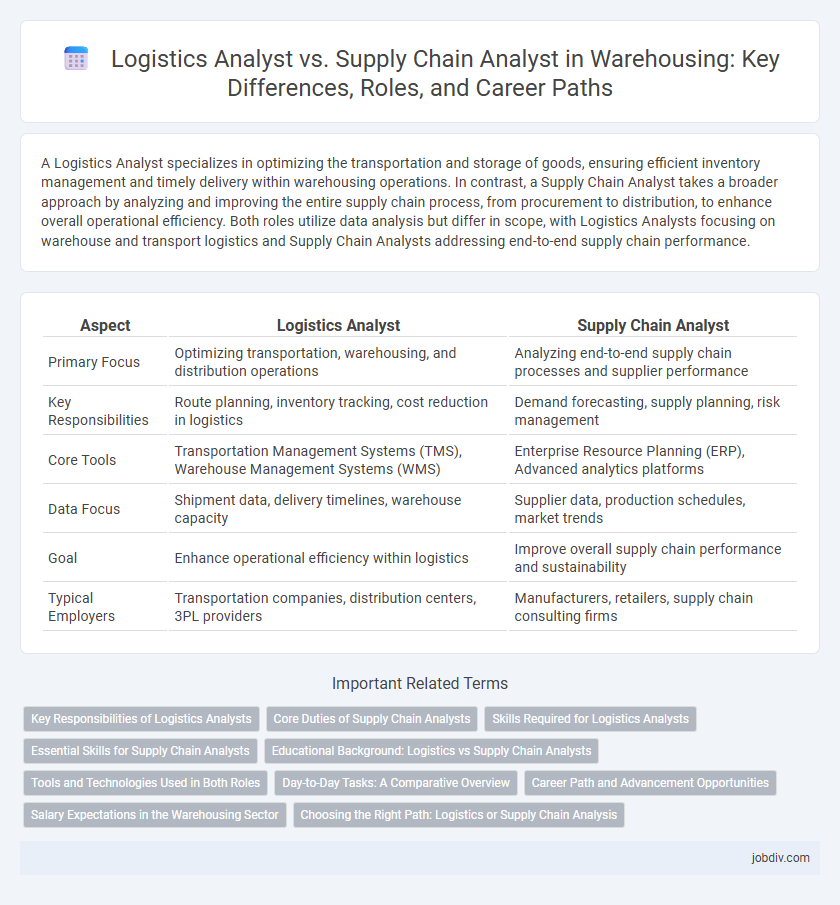A Logistics Analyst specializes in optimizing the transportation and storage of goods, ensuring efficient inventory management and timely delivery within warehousing operations. In contrast, a Supply Chain Analyst takes a broader approach by analyzing and improving the entire supply chain process, from procurement to distribution, to enhance overall operational efficiency. Both roles utilize data analysis but differ in scope, with Logistics Analysts focusing on warehouse and transport logistics and Supply Chain Analysts addressing end-to-end supply chain performance.
Table of Comparison
| Aspect | Logistics Analyst | Supply Chain Analyst |
|---|---|---|
| Primary Focus | Optimizing transportation, warehousing, and distribution operations | Analyzing end-to-end supply chain processes and supplier performance |
| Key Responsibilities | Route planning, inventory tracking, cost reduction in logistics | Demand forecasting, supply planning, risk management |
| Core Tools | Transportation Management Systems (TMS), Warehouse Management Systems (WMS) | Enterprise Resource Planning (ERP), Advanced analytics platforms |
| Data Focus | Shipment data, delivery timelines, warehouse capacity | Supplier data, production schedules, market trends |
| Goal | Enhance operational efficiency within logistics | Improve overall supply chain performance and sustainability |
| Typical Employers | Transportation companies, distribution centers, 3PL providers | Manufacturers, retailers, supply chain consulting firms |
Key Responsibilities of Logistics Analysts
Logistics Analysts are responsible for optimizing transportation routes, managing inventory levels, and analyzing shipping data to improve efficiency and reduce costs in warehousing operations. They coordinate with carriers and warehouses to ensure timely delivery and maintain compliance with regulatory requirements. Their role includes using data-driven insights to enhance supply chain logistics performance and support overall distribution strategies.
Core Duties of Supply Chain Analysts
Supply Chain Analysts focus on optimizing end-to-end supply chain processes by analyzing data related to procurement, inventory management, and demand forecasting to enhance overall efficiency and reduce costs. Their core duties include evaluating supplier performance, identifying bottlenecks in the supply chain, and collaborating with cross-functional teams to implement strategic improvements. Unlike Logistics Analysts, who primarily concentrate on transportation and distribution logistics, Supply Chain Analysts take a broader approach by integrating sourcing, production, and delivery operations for comprehensive supply chain optimization.
Skills Required for Logistics Analysts
Logistics Analysts require advanced skills in data analysis, inventory management, and transportation planning to optimize warehousing operations effectively. Proficiency in software tools such as Excel, SQL, and warehouse management systems (WMS) is essential for tracking shipments and analyzing supply chain efficiencies. Strong problem-solving abilities and knowledge of regulatory compliance ensure seamless coordination between suppliers, carriers, and storage facilities.
Essential Skills for Supply Chain Analysts
Supply Chain Analysts require strong data analysis skills, proficiency in ERP software, and expertise in demand forecasting to optimize inventory and streamline operations. Advanced Excel abilities, knowledge of supply chain modeling, and effective communication skills are essential for interpreting complex logistics data and collaborating across departments. Familiarity with warehouse management systems (WMS) and key performance indicators (KPIs) enables Supply Chain Analysts to identify inefficiencies and implement cost-saving strategies.
Educational Background: Logistics vs Supply Chain Analysts
Logistics analysts typically possess a degree in logistics, transportation, or supply chain management, emphasizing operational efficiency and transportation systems. Supply chain analysts often hold degrees in supply chain management, business administration, or industrial engineering, focusing on the end-to-end integration of supply chain processes. Both roles benefit from coursework in data analysis, inventory management, and systems optimization to enhance warehousing and distribution effectiveness.
Tools and Technologies Used in Both Roles
Logistics Analysts primarily utilize transportation management systems (TMS), warehouse management systems (WMS), and route optimization software to enhance distribution efficiency. Supply Chain Analysts rely on enterprise resource planning (ERP) platforms, advanced analytics tools like Tableau or Power BI, and demand forecasting software to optimize end-to-end supply chain processes. Both roles increasingly incorporate AI-driven predictive analytics and IoT technologies to improve visibility and decision-making across warehousing and logistics operations.
Day-to-Day Tasks: A Comparative Overview
Logistics Analysts concentrate on optimizing transportation routes, managing inventory levels, and coordinating warehouse operations to ensure timely delivery and reduce costs. Supply Chain Analysts focus on analyzing data across procurement, production, and distribution to improve overall supply chain efficiency and forecast demand. Both roles require strong data analysis skills, but Logistics Analysts operate more on operational execution, while Supply Chain Analysts emphasize strategic planning and process improvement.
Career Path and Advancement Opportunities
Logistics Analysts specialize in optimizing warehouse operations and transportation efficiency, often advancing into roles like Logistics Manager or Operations Director with a focus on distribution and inventory control. Supply Chain Analysts have a broader scope, analyzing end-to-end supply chain processes, which can lead to positions such as Supply Chain Manager or Procurement Director, emphasizing strategic planning and supplier relationships. Career advancement for both roles depends on mastering data analysis, process optimization, and cross-functional collaboration within warehousing and distribution networks.
Salary Expectations in the Warehousing Sector
Logistics Analysts in the warehousing sector typically earn an average salary ranging from $55,000 to $75,000 annually, reflecting their focus on optimizing transportation and inventory flow. Supply Chain Analysts command slightly higher salaries, often between $65,000 and $85,000, due to their broader role in demand forecasting and vendor management. Variations in salary expectations depend on factors such as geographic location, experience level, and the specific responsibilities within warehousing operations.
Choosing the Right Path: Logistics or Supply Chain Analysis
Choosing between a Logistics Analyst and a Supply Chain Analyst hinges on your focus within warehousing operations; Logistics Analysts optimize transportation, inventory management, and order fulfillment efficiency, while Supply Chain Analysts evaluate end-to-end supply chain processes from procurement to delivery. Logistics roles require strong skills in warehouse management systems (WMS) and transportation management systems (TMS), whereas supply chain analysis demands expertise in data analytics, demand forecasting, and supplier performance metrics. Understanding the key performance indicators (KPIs) like on-time delivery rates, inventory turnover, and supply chain cycle time helps determine which career path aligns with your strengths and organizational goals.
Logistics Analyst vs Supply Chain Analyst Infographic

 jobdiv.com
jobdiv.com